高中英语 Unit 1《Festival around the world》教案1 新人教版必修3
- 格式:pdf
- 大小:139.39 KB
- 文档页数:6
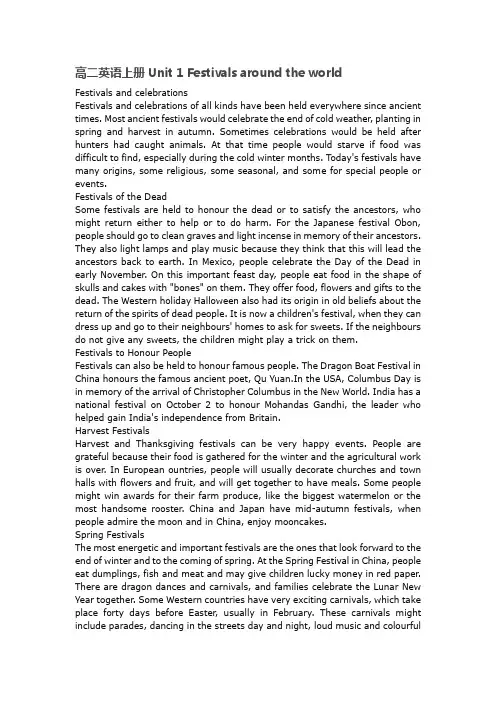
高二英语上册Unit 1 Festivals around the worldFestivals and celebrationsFestivals and celebrations of all kinds have been held everywhere since ancient times. Most ancient festivals would celebrate the end of cold weather, planting in spring and harvest in autumn. Sometimes celebrations would be held after hunters had caught animals. At that time people would starve if food was difficult to find, especially during the cold winter months. Today's festivals have many origins, some religious, some seasonal, and some for special people or events.Festivals of the DeadSome festivals are held to honour the dead or to satisfy the ancestors, who might return either to help or to do harm. For the Japanese festival Obon, people should go to clean graves and light incense in memory of their ancestors. They also light lamps and play music because they think that this will lead the ancestors back to earth. In Mexico, people celebrate the Day of the Dead in early November. On this important feast day, people eat food in the shape of skulls and cakes with "bones" on them. They offer food, flowers and gifts to the dead. The Western holiday Halloween also had its origin in old beliefs about the return of the spirits of dead people. It is now a children's festival, when they can dress up and go to their neighbours' homes to ask for sweets. If the neighbours do not give any sweets, the children might play a trick on them.Festivals to Honour PeopleFestivals can also be held to honour famous people. The Dragon Boat Festival in China honours the famous ancient poet, Qu Yuan.In the USA, Columbus Day is in memory of the arrival of Christopher Columbus in the New World. India has a national festival on October 2 to honour Mohandas Gandhi, the leader who helped gain India's independence from Britain.Harvest FestivalsHarvest and Thanksgiving festivals can be very happy events. People are grateful because their food is gathered for the winter and the agricultural work is over. In European ountries, people will usually decorate churches and town halls with flowers and fruit, and will get together to have meals. Some people might win awards for their farm produce, like the biggest watermelon or the most handsome rooster. China and Japan have mid-autumn festivals, when people admire the moon and in China, enjoy mooncakes.Spring FestivalsThe most energetic and important festivals are the ones that look forward to the end of winter and to the coming of spring. At the Spring Festival in China, people eat dumplings, fish and meat and may give children lucky money in red paper. There are dragon dances and carnivals, and families celebrate the Lunar New Year together. Some Western countries have very exciting carnivals, which take place forty days before Easter, usually in February. These carnivals might include parades, dancing in the streets day and night, loud music and colourfulclothing of all kinds. Easter is an important religious and social festival for Christians around the world. It celebrates the return of Jesus from the dead and the coming of spring and new life. Japan's Cherry Blossom Festival happens a little later. The country, covered with cherry tree flowers, looks as though it is covered with pink snow.People love to get together to eat, drink and have fun with each other. Festivals let us enjoy life, be proud of our customs and forget our work for a little while.。
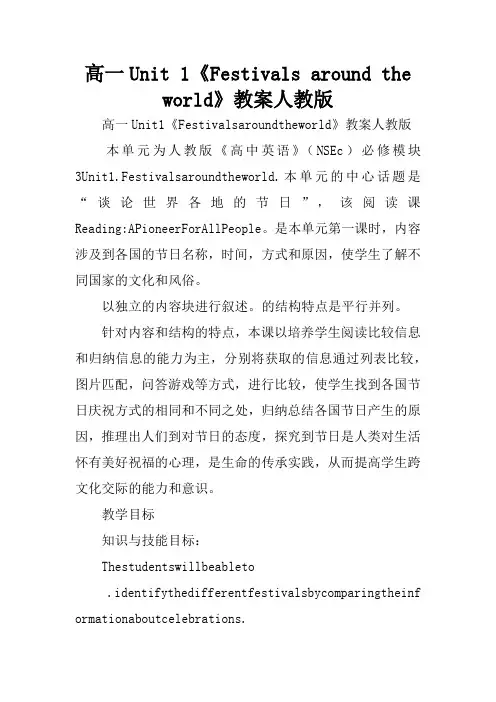
高一Unit 1《Festivals around theworld》教案人教版高一Unit1《Festivalsaroundtheworld》教案人教版本单元为人教版《高中英语》(NSEc)必修模块3Unit1.Festivalsaroundtheworld.本单元的中心话题是“谈论世界各地的节日”,该阅读课Reading:APioneerForAllPeople。
是本单元第一课时,内容涉及到各国的节日名称,时间,方式和原因,使学生了解不同国家的文化和风俗。
以独立的内容块进行叙述。
的结构特点是平行并列。
针对内容和结构的特点,本课以培养学生阅读比较信息和归纳信息的能力为主,分别将获取的信息通过列表比较,图片匹配,问答游戏等方式,进行比较,使学生找到各国节日庆祝方式的相同和不同之处,归纳总结各国节日产生的原因,推理出人们到对节日的态度,探究到节日是人类对生活怀有美好祝福的心理,是生命的传承实践,从而提高学生跨文化交际的能力和意识。
教学目标知识与技能目标:Thestudentswillbeableto.identifythedifferentfestivalsbycomparingtheinf ormationaboutcelebrations.2.explainthereasonwhythefestivalscomeintobeingbyfin dingoutthesimilaritiesanddifferences.3.describetheirfavoritefestivalsbyusingthelanguagef romthetext.教学重点和难点)为全体学生进行有效性阅读策略的指导,包括语篇分析、猜测词义,逻辑推理、归纳概括等技巧。
2)通过比较信息,归纳总结各国节日产生的原因,推理出人们到对节日的态度和节日的意义。
教学过程教学步骤教学活动设计意图Pre-reading:Step1.Brainstorm:motivatetheSsbyaskingsomequestions.Q1:Doyouanyfestivalsaroundtheworld?Step2.matchthecelebrationwiththefestivals.Q2:DoyouknowhowpeoplecelebratetheseFestivals?Doaquiz.Step2.DiscussionSsdiscussthefollowingquestionsQ1:Howdotheycomeintobeing?Q2:whatdotheyhaveincommon?Andwhataretheredifference amongthem?问题引发了学生的思考,调动学生的已知,将学生的思维活动引导到课文主题上来。
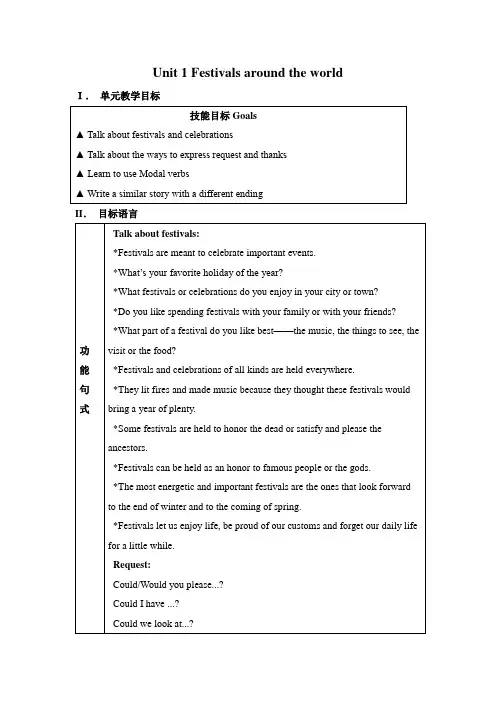
Unit 1 Festivals around the world I.单元教学目标II.目标语言III. 教材分析与教材重组1. 教材分析本单元以节日为话题,介绍古今中外节日的种类、由来、意义以及人们的活动和习俗,旨在通过本单元的学习使学生不但了解我国的节日,而且对外国的节日也有所了解,进而拓展社会文化背景、增加跨国文化知识;使学生复习和巩固运用请求和感谢的表达法,掌握情态动词的用法;并尝试根据阅读的文章写一个不同的结局,能表达自己的观点和想法。
1.1 Warming Up 旨在通过表格引导学生讨论并列举出五个我国节日的日期、庆祝内容和民俗。
可以刚刚过去的春节为话题导入对节日的讨论;使他们由自己的经历谈起,扩展到别的节日以及外国的重要节日,激发学生的兴趣,激活他们关于节日的背景知识,为本单元的学习做准备。
1.2 Pre-reading是Reading 的热身活动。
主要通过两个问题引导学生思考并讨论自己最喜欢的节日及欢度方式,进而了解学生对节日的认识,以便为阅读作好铺垫。
1.3 Reading 的五篇小短文分别介绍古代节日、亡灵节、纪念名人的节日、丰收节、春天的节日等,使学生了解各种节日的由来及其存在的意义。
此部分载有Festivals的重要信息,还呈现了大量的词汇和主要的语法---情态动词的用法。
处理时应作为重点、整体处理,通过上下文来教词汇、语法,并引导学生分析长句、难句和复杂句。
1.4 Comprehending是考察对阅读内容的进一步理解。
练习一:六个问题让学生对文章内容有浅层理解并考察课文细节,但又不能仅仅拘泥于课文,要引导学生理解课文内容的基础上联系现实生活。
练习二:要求学生讨论哪些节日是最重要的,哪些是最有趣的,以表格的形式检查学生对所读节日的理解,并训练他们举一反三的归纳和推理能力。
练习三:要求学生找出各种节日共有的三件事,然后讨论为什么这些事对各地的人们都很重要。
这就要求学生不仅要温习文章内容而且要结合实际,阐述自己的想法,挖掘学生的思维能力和语言表达能力。
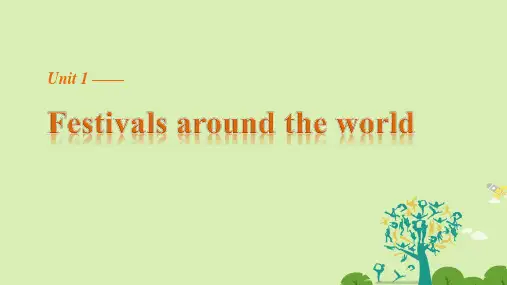
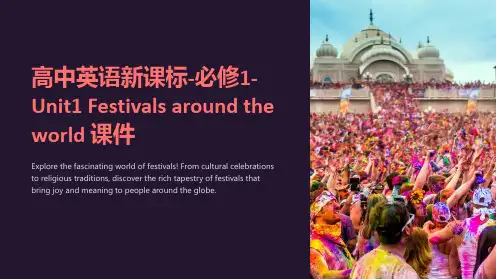
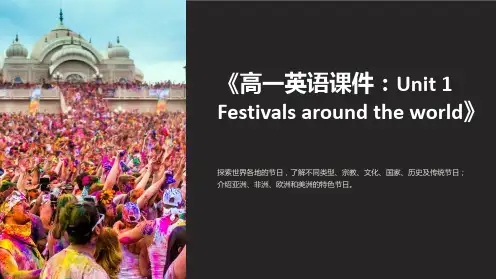
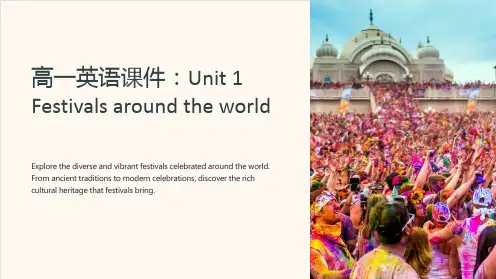
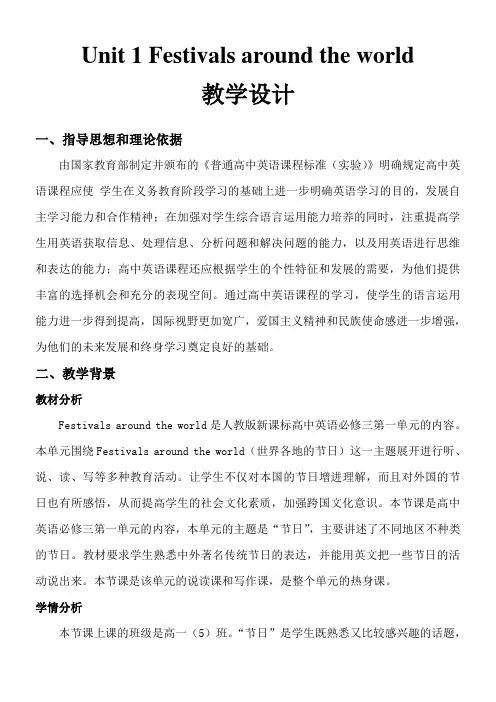
Unit 1 Festivals around the world教学设计一、指导思想和理论依据由国家教育部制定并颁布的《普通高中英语课程标准(实验)》明确规定高中英语课程应使学生在义务教育阶段学习的基础上进一步明确英语学习的目的,发展自主学习能力和合作精神;在加强对学生综合语言运用能力培养的同时,注重提高学生用英语获取信息、处理信息、分析问题和解决问题的能力,以及用英语进行思维和表达的能力;高中英语课程还应根据学生的个性特征和发展的需要,为他们提供丰富的选择机会和充分的表现空间。
通过高中英语课程的学习,使学生的语言运用能力进一步得到提高,国际视野更加宽广,爱国主义精神和民族使命感进一步增强,为他们的未来发展和终身学习奠定良好的基础。
二、教学背景教材分析Festivals around the world是人教版新课标高中英语必修三第一单元的内容。
本单元围绕Festivals around the world(世界各地的节日)这一主题展开进行听、说、读、写等多种教育活动。
让学生不仅对本国的节日增进理解,而且对外国的节日也有所感悟,从而提高学生的社会文化素质,加强跨国文化意识。
本节课是高中英语必修三第一单元的内容,本单元的主题是“节日”,主要讲述了不同地区不种类的节日。
教材要求学生熟悉中外著名传统节日的表达,并能用英文把一些节日的活动说出来。
本节课是该单元的说读课和写作课,是整个单元的热身课。
学情分析本节课上课的班级是高一(5)班。
“节日”是学生既熟悉又比较感兴趣的话题,因此可以激发学生的求知欲,更深层次的理解本课内容。
但由于课文也涉及到西方文化,学生学习和理解有一定难度。
三、教学目标知识目标:(1)掌握生词、词组、句型的用法(2)掌握中外传节日的基本知识(3)掌握中国重要传统节日春节的相关表达能力目标:(1)通过开展小组活动以及提问讨论的方式,引导学生积极与人合作,相互学习帮助,培养团队意识(2)通过同学与老师之间的交流,在教学过程中提高语言表达能力,初步培养学生活学活用的能力(3)通过对话、讨论和写作提高学生的听说读写能力情感目标:了解世界文化的多样性以及增强对本国传统特色文化的保护意识,增强跨文化交际能力。
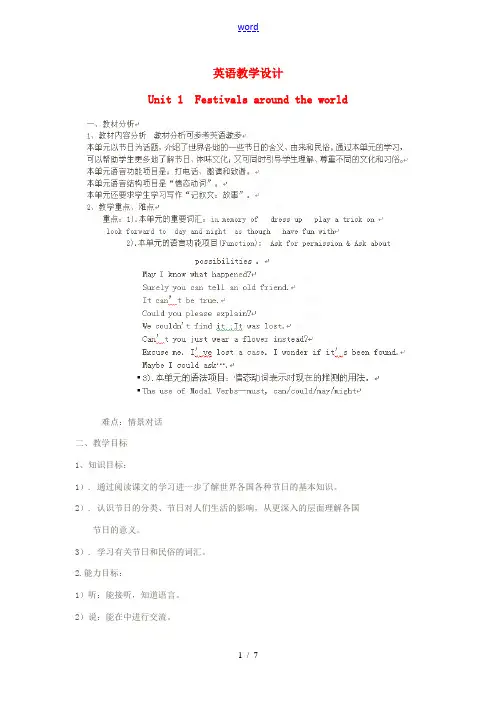
英语教学设计Unit 1 Festivals around the world难点:情景对话二、教学目标1、知识目标:1). 通过阅读课文的学习进一步了解世界各国各种节日的基本知识。
2). 认识节日的分类、节日对人们生活的影响,从更深入的层面理解各国节日的意义。
3). 学习有关节日和民俗的词汇。
2.能力目标:1)听:能接听,知道语言。
2)说:能在中进行交流。
3)读:学习掌握跳读、略读、细读、概括和分析等阅读技能,掌握语言的内容。
3.情感目标:1).通过设计一些情景或提供各种图片,激发学生的学习兴趣,在英语情景学习和讨论中使学生的情感得到充分的体现;在课堂教学中突出了以学生为主体的学习地位,充分发挥学生的个性,培养了学生的创造力和想象力。
2).通过阅读课文,分析和挖掘课文中人物的思想感情,使学生树立起正确的审美观、人生观和价值观。
4.教学策略:1).开放式教学策略。
以有限的课堂为载体,给学生提供足够的空间,充分发挥学生的想象力,培养学生的创新能力.如:brainstorm, role playing, given situation, acting 等活动。
2).任务型活动策略。
在做中学和练,任务明确,活动面广,使学生在交际中真实运用所学知识。
3). 循序渐进和梯度分明的教学策略。
教学活动由易到难,由简到繁,给有困难的学生搭建一个平台,让学习有能力的学生“跳一跳”摘到果子。
5.学习策略:1).在学习中借助联想,根据情景等非语言信息进行理解和表达。
2).在听、读过程中,能根据情景和上下文猜测词义或推测每一幕的大意。
3).能根据所接触语言材料中的语言规律加以总结和归纳。
6.文化意识:1).学习和了解中外节假日。
2).通过学习、分析世界节假日形成的原因。
3).通过中外节假日的对比,加深对中国节假日的理解。
三、教学原则1.以任务型教学作为课堂教学的设计理念,强调教学方法的灵活性和多样性。
具体采用情景教学法(Situational Approach)、整体语言教学法(Whole Language Teaching)和交际法(municative Approach)等教学方法,学习者通过自学、讨论、交流、询问、演练等各种形式来学习并掌握语言,从而使语言的学习既富有成效,又多姿多彩。
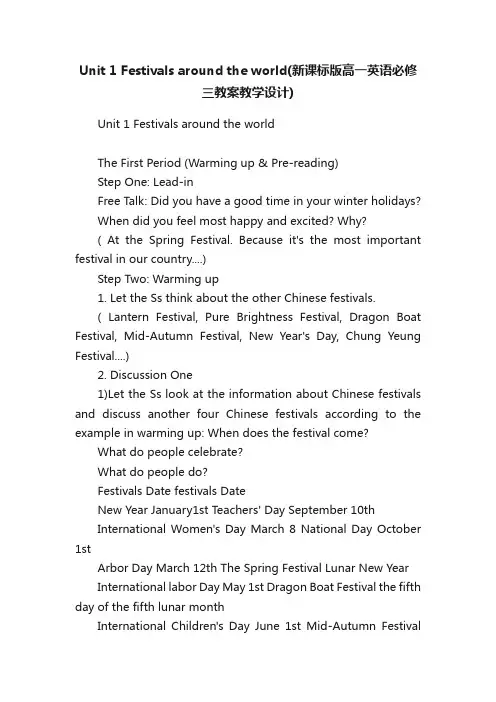
Unit 1 Festivals around the world(新课标版高一英语必修三教案教学设计)Unit 1 Festivals around the worldThe First Period (Warming up & Pre-reading)Step One: Lead-inFree Talk: Did you have a good time in your winter holidays?When did you feel most happy and excited? Why?( At the Spring Festival. Because it's the most important festival in our country....)Step Two: Warming up1. Let the Ss think about the other Chinese festivals.( Lantern Festival, Pure Brightness Festival, Dragon Boat Festival, Mid-Autumn Festival, New Year's Day, Chung Yeung Festival....)2. Discussion One1)Let the Ss look at the information about Chinese festivals and discuss another four Chinese festivals according to the example in warming up: When does the festival come?What do people celebrate?What do people do?Festivals Date festivals DateNew Year January1st Teachers' Day September 10thInternational Women's Day March 8 National Day October 1stArbor Day March 12th The Spring Festival Lunar New Year International labor Day May 1st Dragon Boat Festival the fifth day of the fifth lunar monthInternational Children's Day June 1st Mid-Autumn Festivalthe 15th day of the 8th lunar monthArmy Day August 1st Lantern Festival the 15th day of the 1st lunar monthChinese Youth Day May 4th Pure Brightness Day April the fifth2) Let the Ss fill in the form in the warming up and ask some to share their opinions with the whole class.3 Discussion TwoTalk about some foreign festivals.( Christmas, April Fools Day, Easter Day, Halloween, Valentine's Day, Thanksgiving Day, Obon...)Step three: Pre-readingLet students think about the questions:1) What is your favourate holiday of the year? Why?2)What festivals or celebrations do you enjoy in your city or town? Do you like spending festivals with your family or with friends? What part of a festival do you like best- the music, the things to see, the visits or the food?Step Four: Language Points1.mean to do 打算做某事mean doing 意味着….I never meant him to work for us.Passing the entrance examination means being admitted into college.2. celebrate vt.(1) do sth to show that a day or an event is important 庆祝;祝贺celebrate Christmas / one’s birthday / a wedding anniversary / a victory(2) praise and honor 赞扬;称颂The names of many heroes are celebrated by the poets.词语辨析:celebrate, congratulatecelebrate后常接日期、事情或场合。
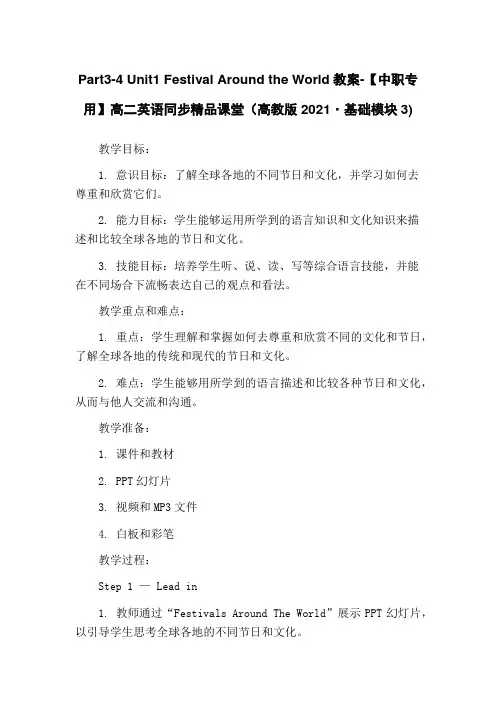
Part3-4 Unit1 Festival Around the World教案-【中职专用】高二英语同步精品课堂(高教版2021·基础模块3) 教学目标:1. 意识目标:了解全球各地的不同节日和文化,并学习如何去尊重和欣赏它们。
2. 能力目标:学生能够运用所学到的语言知识和文化知识来描述和比较全球各地的节日和文化。
3. 技能目标:培养学生听、说、读、写等综合语言技能,并能在不同场合下流畅表达自己的观点和看法。
教学重点和难点:1. 重点:学生理解和掌握如何去尊重和欣赏不同的文化和节日,了解全球各地的传统和现代的节日和文化。
2. 难点:学生能够用所学到的语言描述和比较各种节日和文化,从而与他人交流和沟通。
教学准备:1. 课件和教材2. PPT幻灯片3. 视频和MP3文件4. 白板和彩笔教学过程:Step 1 — Lead in1. 教师通过“Festivals Around The World”展示PPT幻灯片,以引导学生思考全球各地的不同节日和文化。
2. 打开视频,展示一些全球各地的节日和文化,帮助学生更好地了解各种节日的不同。
Step 2 — Reading1. 通过阅读教材的有关内容,让学生了解各种节日和文化,并了解其背后的故事。
2. 问和回答学生中英文句型,过程中引导学生讨论节日庆祝活动中的不同文化特色、重要活动和传统食物等问题,并介绍其中的一些英语单词和短语。
Step 3 — Practice1. 回忆并讲解Unit 1 Part 2中已学过的单词和语言知识,再进行一些单词和短语的拓展讲解,并阅读有关Unit1 Part 3中的新词汇和表达方式。
2. 通过与同学进行一些角色扮演、练习对话、讨论时事、介绍课外活动等练习,帮助学生熟悉这些新词汇和表达方式。
Step 4 — Writing1. 讲解如何写一篇有关全球节日和文化差异和各种节日的文章。
2. 引导学生找出文章中有用的词汇和短语,如“How to respect other cultures”和“celebrating cultural differences”,并解释其含义。
Part6 Unit1 Festival Around the World教案-【中职专用】高二英语同步精品课堂(高教版2021·基础模块3)教案:Festival Around the World适用对象:本教案适用于高二年级的英语教学,特别是基础模块3中的Unit1 Festival Around the World。
教学目标:1. 学生能够了解世界各地不同的节日和庆祝方式。
2. 学生能够正确理解文本中的单词和词组,以及运用所学知识表达自己的观点。
3. 学生能够进行听力、口语和写作练习,提高语言水平和能力。
4. 学生能够拓展自己的文化视野,增强对世界的认识和理解。
教学内容:1. 课前预习:学生针对文本中的生词、短语和文化背景进行预习,并准备相关问题以便上课时讨论。
2. 听力练习:教师播放关于不同节日的音频材料,让学生在听的同时记录重点信息,并回答相关问题。
3. 阅读练习:教师分发文本并让学生自行阅读,理解文中内容并完成相关问题。
4. 讨论练习:教师和学生之间进行针对学习到的文化和语言知识的交流讨论,让学生能够在实践中提高自己的表达和交流能力。
5. 作文练习:教师布置文化比较作文,让学生选取两个不同的节日并在语言和文化方面进行比较。
教学方法:1. 听力互动法:通过听音频材料和回答相关问题,让学生能够更好地掌握听力技巧和技能。
2. 阅读理解法:通过阅读文本并对其提出问题,让学生能够挖掘出文本中的重点信息和意义。
3. 讨论互动法:通过教师和学生之间的互动讨论,让学生能够提高自己的表达和交流能力。
4. 作文训练法:通过让学生写作,让学生能够更好地掌握语言表达技巧和文化知识。
教学过程:1. 教师介绍本堂课的内容及教学目标,并让学生进行课前预习。
2. 教师播放关于不同节日的音频材料,让学生在听的同时记录重点信息,并回答相关问题。
3. 教师向学生介绍文本内容,学生自行阅读并完成相关问题。
4. 教师与学生进行讨论,针对所学到的文化背景和语言知识进行交流和讨论。
Part5 Unit1 Festival Around the World教案-【中职专用】高二英语同步精品课堂(高教版2021·基础模块3)一、教材分析本单元是《高教版英语》第三册基础模块的第五个单元,主要介绍世界各地不同的传统节日,包括春节、感恩节、万圣节、新年、复活节等等。
教材内容涉及到节日的来源、庆祝活动、文化背景等方面,旨在让学生了解不同国家和地区的文化,增强跨文化意识。
二、教学目标1.知识目标:(1) 能够掌握本单元词汇和句型;(2) 知晓全球各地不同节日的庆祝方式和文化背景。
2.技能目标:(1) 培养学生的阅读技巧和能力;(2) 提高学生的听说能力;(3) 培养学生的跨文化交际能力。
3.情感目标:(1) 让学生了解和尊重不同国家和地区的文化;(2) 提高学生的跨文化意识和包容性。
三、教学重难点1.教学重点(1) 掌握本单元词汇和句型;(2) 了解全球各地不同节日的庆祝方式和文化背景。
2.教学难点(1) 培养学生的跨文化交际能力;(2) 培养学生的阅读技巧和能力。
四、教学方法1.听说训练法通过听力和口语练习,提高学生的听说能力。
2.阅读技巧训练法通过教授阅读技巧,帮助学生提高阅读能力。
3.图片呈现法通过图片的呈现,加深学生对节日庆祝活动的理解和记忆。
五、教学过程1.导入(5分钟)介绍学习本单元的目的,并通过“想象一个场景”引导学生进入学习状态。
2.阅读课文(20分钟)(1) 教师先让学生通读课文,了解单元内容;(2) 教师重点讲解课文细节,并提供习题进行训练。
3.口语训练(25分钟)(1) 教师根据单元内容,让学生进行口语训练,练习表达;(2) 学生分组,模拟庆祝节日的场景,进行对话练习。
4.阅读技巧训练(25分钟)(1) 教师通过讲解阅读技巧,帮助学生理解课文;(2) 教师引导学生完成相关练习,巩固所学知识。
5.听力训练(20分钟)(1) 教师将听力材料播放两遍,让学生听懂并理解;(2) 学生集中精力,记录挖掘关键信息,回答听力测试问题。
Unit 1 Festival around the world1.他们将要用唱歌和跳舞来庆祝节日。
(celebrate)2.我们学校的运动会将在下一个周六举行。
(take place)3.这个十岁的孩子精力非常充沛。
(energetic)4.她盛装出席这次会议。
(dress up)5.这个博物馆为纪念这位著名的艺术家而建。
(in memory of)6.万物都有自己的美,但是每个人都能发现.(beauty)7. 丽丽走在大街上好像不认识我似的。
(as if)8.晚上,我们聚在火炉边聊天。
(gather).9.在中秋节的时候,家人在一起吃大餐并玩得很开心.(feast, have fun with)10.爸爸是一个很虔诚的人,每个星期去教堂。
(religious, church)11.她盼望见到她在外国读书的妹妹。
(look forward to)12. 我把你的生日忘了,所以我必须向你道歉。
(apologize)13.这个食物会让我想起家乡。
(remind)14. 我很钦佩她的勇气。
(admire)15. 我邀请她来吃饭,但她没有露面。
(turn up)16. 当我们去一个不同的国家时,要入乡随俗(custom)17.很明显他对你的计划评价不高。
(obvious)18.守信用对一个来说很重要。
(keep one’s word)19.我们屏息来观看她的表演。
(hold one’s breath)20.没有得到父母的允许,不能私自外出。
(permission)Unit 1 Festival around the world1.他们将要用唱歌和跳舞来庆祝节日。
(celebrate)2.我们学校的运动会将在下一个周六举行。
(take place)3.这个十岁的孩子精力非常充沛。
(energetic)4.她盛装出席这次会议。
(dress up)5.这个博物馆为纪念这位著名的艺术家而建。
(in memory of)6.万物都有自己的美,但是每个人都能发现.(beauty)7. 丽丽走在大街上好像不认识我似的。
Unit 1 Festival around the worldPart 1 Teaching Design第一部分 教学设计Period 1 A sample lesson plan for reading(FESTIVALS AND CELEBRATIONS)IntroductionIn this period, after the warming up, students will first be guided to imagine, talk and share what they know about festivals. Then they will be helped to read an exposition (说明文)entitled FESTIVALS AROUND THE WORLD. Examples of “Warming Up” designs are presented in this book for teachers’ reference.ObjectivesTo help students understand the text’s forms and contents and learn about festival around the worldTo help students communicate on the topic in focus with the words, expressions and structures learned in this unitFocusWords harvest, starve, trick, gain, gather, award, admire, blossom, fool, apologize, dro wn, wipe, weave, weep, remind, forgiveExpressions take place, in memory of, dress up, play a trick on, look forward to, day and night, as though, have fin with, turn up, keep one’sword, hold one’s breath, set off, remind … of…Patterns 1. Discuss when they take place.2. Festivals and cele brations of all kinds are held everywhere.3. The most energetic and important festivals are the ones that lend of winter and the coming of spring.4. The country is covered with cherry trees flowers so that it looksas though it might be covered with pink snow.5. In European countries it is the custom to decorate churches andtown halls with flowers and fruit.6. If they are not given anything, the children might play a trick.7. Because they thought these festivals would bring a year ofplenty.AidsMultimedia facilities, tape-recorder, photos, diagramsProcedures1. Warming upWarming up by discussingGood morning, class. Today we are going to read about FESTIVALS AND CELEBRATIONS. But first, I’d like to have you work in groups and list five Chinese festivals that you know. When do they take place? What do they celebrate? And what people do at that tim e?Warming up by watching and listeningHi, every one. Look at the photos and listen to me telling you about some Western Festivals. (用原版)Some Western FestivalsValentine’s Day , February 14 情人节Candy, flowers and other tokens of affection are exchanged on this day, in honor of two martyrs, both named St. Valentine.April Fool’s Day, April 1 愚人节Franksters feel that it is permissible toplayall sorts of tricks on this day.Mother’s Day 母亲节The second Sunday in May, set aside to honor mothers.Father’s Day 父亲节The third Sunday in June, set aside to honor fathers.Halloween , October 31 万圣节A special day for making merry, wearing costumes and playing old-fashioned games.A favorite with children.Easter 复活节A Christian holy day in March or April whenChristians remember the death of Christ and hisreturn to life.Thanksgiving Day 感恩节Generally the fourth Thursday in November, set aside for national thanksgiving, especially for our democratic form of government. It is a legal holiday in all states. Labor’s Day 劳动节The first Monday in September. Set aside to honor labor, it is a legal holiday in all states.Christmas Day, December 25 圣诞节This is both a legal and religi ous holiday, it observes theanniversary of the birth of Jesus. All states and all those ofthe Christian faith celebrate this holiday.Warming up by learning vocabularyTurn to page 96, and go over the vocabulary list for Unit 1. Find out the relationship between the spelling and the pronunciation.2. Pre-reading by imagining and sharingHello! Now you can celebrate everyday! Everyday is a holiday. Imagine somewhere someone is celebrating right now. Our world is filled with mystical celebrations and powerful memories. Come and tell the class what holiday it is today.3. Talking and sharingWork in groups of four. Tell your group mates what festivals or celebrations do you enjoy in your city or town?4. Listening to the recordingNow please listen to the recording of the text FESTIVALS AND CELEBRATIONS. Pay attention to the pronunciation of each word and the pauses within each sentence. I will play the tape twice.5. Reading and underliningNext you are t o read and underline all t he useful expressions or collocations in the passage. Copy them to your notebook after class as homework.Collocations from FESTIVALS AND CELEBRATIONShold festivals and celebrations, catch animals, have food吃饭, light fires, make music, bring a year of plenty带来富足的一年, honour the dead纪念死去了的人, satisfy and please sb.讨好取悦某人, do harm to对……有害, clean the graves扫墓, light incense, in memory of 纪念;追念, light lamps, play music, lead sb. back to earth, on an important feast day, in the s hake of sth., offer sth. to sb., have the origin as an event, ask for sth., dress up乔装打扮;穿上盛装, play a trick诈骗;开玩笑, hold festivals as an honour to sb., a national holiday, gain …’s independence,gather… for…, a season of agricultural work, decorate churches with 用……装饰教堂, get together聚会, have meals吃饭, win awards for sth., admire the moon, give gifts of moon cakes, an energetic and important festival, look forward to期望;期待;盼望, eat dumplings吃饺子, give sb. lucky money给某人压岁钱, in red paper, dragon dances, celebrate the lunar New Year庆祝阴历的新年, take place发生, day and night日日夜夜, loud music, colourful clothing of all kinds, an important religious and social festival, be covered with 由……覆盖., have fun with each other彼此玩得开心, enjoy life享受生活, be proud of为……自豪, forget sth. for a little while暂时忘记某事6. Reading and transferring informationRead the text again to complete the table listing festivals and their celebrations.FESTIVALS AND C ELEBRATIONSAncient Festivals Festival ofthe DeadFestival toHonour PeopleHarvestFestivalSpringFestivalcelebrate theend of the coldweather,planting andharvest;capture ofanimals.… … … …For reference:FESTIVALS AND CELEBRATIONSAncient Festivals Festival ofthe DeadFestival toHonor PeopleHarvest Festival Spring Festivalcelebrate the end of the cold weather, honor thedead, satisfyand pleasean honor tofamous peopleor the gods,happy events forfood gatheringand end oflook forward tothe end of winterand to the comingplantingand harvest;captureofanimals. the ancestors agricultural work. of spring 7. Reading to decide on the type of writing and summary of the text Type of writingThis is a piece of descriptive writing. Main idea of the passageFestivals and celebrations of all kinds, such as festivals of the dead, festivals to honourpeople, harvest festivals and spring festivals,have been held ever since the ancient times.Topic sentence of 1stparagraph Today’s festivals have many origins. Topic sentence of 2nd paragraphFestivals are held to honour the dead, or satisfy and please the ancestors. Topic sentence of 3rd paragraphFestivals can be held to honour famous people.Topic sentence of 4th paragraph Harvest and Thanksgiving festivals can be veryhappy events.Topic sentence of 5th paragraph The most energetic and important festivals arethe ones that look forward to the end of thewinter and the coming of spring.Topic sentence of 6th paragraph Festivals let us enjoy life.8. Closing down by making a diagram and retell the textWe shall end the class by going over the text once again to make a diagram and retell the story with its help.。